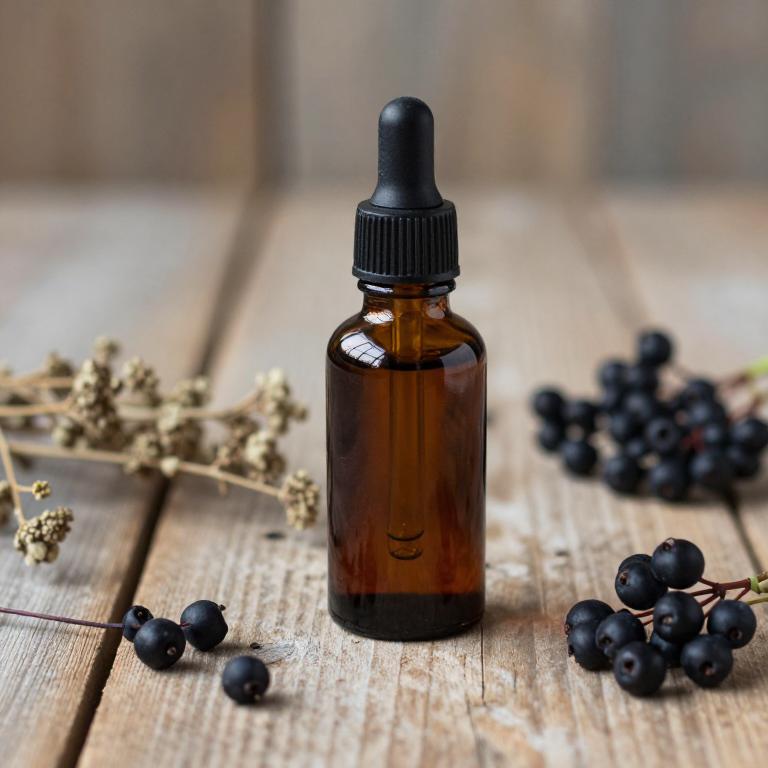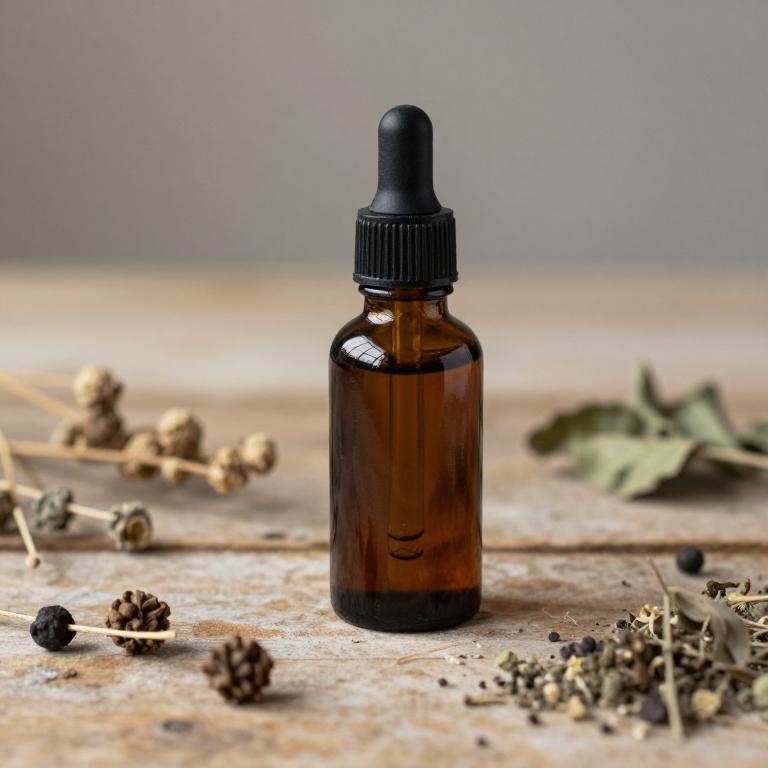10 Best Herbal Tinctures For Tonsillitis

Herbal tinctures have been traditionally used to alleviate symptoms of tonsillitis, a condition characterized by inflammation of the tonsils, often caused by viral or bacterial infections.
These tinctures typically contain potent plant-based ingredients such as echinacea, goldenseal, and sage, which are believed to have antimicrobial and anti-inflammatory properties. They may help reduce throat pain, swelling, and fever associated with tonsillitis by supporting the body's natural immune response. However, while some people find relief using herbal tinctures, they should not replace conventional medical treatments, especially in severe cases.
It is important to consult a healthcare professional before using herbal remedies to ensure safety and effectiveness.
Table of Contents
- 1. Ginger (Zingiber officinale)
- 2. Thyme (Thymus vulgaris)
- 3. Echinacea (Echinacea purpurea)
- 4. St. john's wort (Hypericum perforatum)
- 5. Salvia (Salvia officinalis)
- 6. Stinging nettle (Urtica dioica)
- 7. Yarrow (Achillea millefolium)
- 8. Peppermint (Mentha piperita)
- 9. Black elderberry (Sambucus nigra)
- 10. Ceylon cinnamon (Cinnamomum verum)
1. Ginger (Zingiber officinale)

Zingiber officinale, commonly known as ginger, has been traditionally used for its anti-inflammatory and antimicrobial properties, making it a potential remedy for tonsillitis.
Herbal tinctures made from fresh or dried ginger root are often prepared by soaking the root in alcohol to extract its active compounds, such as gingerol and shogaol. These tinctures may help reduce throat inflammation, alleviate pain, and combat bacterial or viral infections that contribute to tonsillitis. Some studies suggest that ginger can inhibit the growth of Streptococcus pyogenes, a common cause of strep throat.
While ginger tinctures can be a complementary therapy, they should not replace professional medical advice, especially for severe or persistent tonsillitis.
2. Thyme (Thymus vulgaris)

Thymus vulgaris, commonly known as thyme, is a popular herb used in herbal tinctures to support respiratory health, including the treatment of tonsillitis.
The tinctures are typically made by extracting the essential oils and active compounds from thyme leaves and flowers using alcohol, which helps preserve the medicinal properties. Thyme contains thymol, a powerful antiseptic and anti-inflammatory compound that can help reduce throat inflammation and combat bacterial infections. These tinctures may be used as a complementary therapy to alleviate symptoms such as sore throat and swollen tonsils.
However, it is important to consult a healthcare professional before using thyme tinctures, especially for children or individuals with existing health conditions.
3. Echinacea (Echinacea purpurea)

Echinacea purpurea herbal tinctures are commonly used as a natural remedy to support immune function and alleviate symptoms of tonsillitis.
These tinctures are derived from the dried flowers, leaves, and roots of the echinacea plant, which is native to North America. Proponents believe that echinacea can reduce the severity and duration of throat infections by enhancing the body's immune response. While some studies suggest potential benefits, the evidence remains inconclusive, and it is generally recommended to consult a healthcare provider before use, especially for children or individuals with chronic conditions.
As a complementary therapy, echinacea tinctures may offer some relief but should not replace conventional medical treatments for tonsillitis.
4. St. john's wort (Hypericum perforatum)

Hypericum perforatum, commonly known as St. John's wort, is a herbal plant that has been traditionally used for its potential anti-inflammatory and antimicrobial properties.
While it is more commonly associated with treating mild depression, some studies suggest it may have benefits for respiratory infections, including tonsillitis. Herbal tinctures made from Hypericum perforatum can be used as a complementary therapy to support the body's natural healing process during tonsillitis. These tinctures are typically prepared by soaking the dried plant material in alcohol, allowing for the extraction of active compounds such as hypericin and hyperforin.
However, it is important to consult with a healthcare professional before using St. John's wort, as it may interact with certain medications and is not a substitute for conventional treatments.
5. Salvia (Salvia officinalis)

Salvia officinalis, commonly known as sage, has been traditionally used in herbal medicine for its anti-inflammatory and antimicrobial properties.
Tinctures made from sage are often used to alleviate symptoms of tonsillitis due to their ability to reduce swelling and fight bacterial infections. These tinctures can be taken internally or used as a gargle to soothe irritated tonsils and ease throat pain. While sage tinctures may offer natural relief, it is important to consult a healthcare professional before use, especially for chronic or severe cases.
Overall, sage tinctures can be a complementary treatment option for managing mild to moderate tonsillitis.
6. Stinging nettle (Urtica dioica)

Urtica dioica, commonly known as stinging nettle, has been traditionally used in herbal medicine for its anti-inflammatory and immune-boosting properties.
Tinctures made from Urtica dioica can be used to support the body's natural defenses against infections like tonsillitis, which is often caused by bacterial or viral pathogens. The plant contains compounds such as flavonoids and polysaccharides that may help reduce inflammation and soothe sore throat symptoms. When used as a tincture, Urtica dioica is typically diluted in alcohol or glycerin and taken orally in small doses.
However, it is important to consult with a qualified healthcare provider before using it, especially for individuals with allergies or those taking other medications.
7. Yarrow (Achillea millefolium)

Achillea millefolium, commonly known as yarrow, has been traditionally used in herbal medicine for its anti-inflammatory and antiseptic properties.
Tinctures made from yarrow are often prepared using alcohol as a solvent to extract the active compounds, including flavonoids and essential oils, which may help reduce inflammation and soothe throat irritation. While some studies suggest that yarrow may support immune function and alleviate symptoms of respiratory infections, its effectiveness specifically for tonsillitis requires further clinical research. When using yarrow tinctures for tonsillitis, it is important to consult with a healthcare professional to ensure proper dosage and to avoid potential interactions with other medications.
As a complementary therapy, yarrow tinctures may offer some relief, but they should not replace conventional medical treatments for bacterial infections or severe inflammation.
8. Peppermint (Mentha piperita)

Mentha piperita, commonly known as peppermint, has been traditionally used in herbal medicine for its soothing and anti-inflammatory properties.
Peppermint tinctures are often employed to alleviate symptoms of tonsillitis, such as sore throat and inflammation, due to their ability to reduce mucus production and ease respiratory discomfort. The active compounds in peppermint, including menthol and menthone, have a cooling effect that can provide temporary relief from throat irritation. While not a cure for tonsillitis, peppermint tinctures may support overall throat health and complement conventional treatments.
It is important to consult a healthcare provider before using peppermint tinctures, especially for prolonged or severe cases of tonsillitis.
9. Black elderberry (Sambucus nigra)

Sambucus nigra, commonly known as elderberry, is often used in herbal tinctures to support immune health and alleviate symptoms of tonsillitis.
These tinctures are typically prepared by soaking dried elderberries in alcohol, allowing the active compounds such as flavonoids and anthocyanins to be extracted. The anti-inflammatory and antioxidant properties of elderberry may help reduce throat inflammation and boost the body’s defense against viral infections, which are common causes of tonsillitis. While some studies suggest potential benefits, it is important to consult a healthcare provider before using elderberry tinctures, especially for children or individuals with chronic conditions.
As a complementary therapy, elderberry tinctures may support recovery when used alongside conventional treatments for tonsillitis.
10. Ceylon cinnamon (Cinnamomum verum)

Cinnamomum verum, commonly known as true cinnamon, has been traditionally used in herbal medicine for its anti-inflammatory and antimicrobial properties.
When prepared as a tincture, it can be used to support the treatment of tonsillitis by reducing throat inflammation and fighting bacterial infections. The active compounds in cinnamon, such as cinnamaldehyde and eugenol, contribute to its ability to soothe sore throats and alleviate symptoms. To use cinnamon tincture for tonsillitis, it is typically diluted with water or honey and taken orally several times a day.
While it may offer relief, it is important to consult a healthcare professional before using it as a complementary treatment, especially if symptoms persist or worsen.